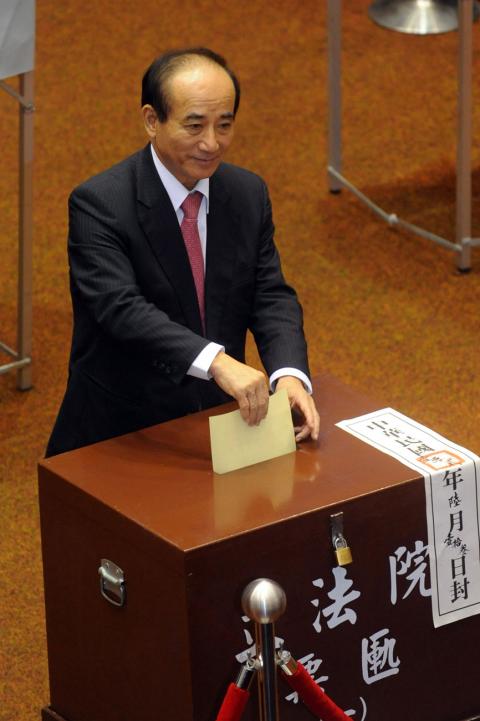The legislature yesterday unanimously supported the Executive Yuan’s veto of a controversial amendment to the Accounting Act (會計法) on the first day of a two-week extra session, temporarily snuffing a political firestorm.
A vote of 110 to zero means that the amendment, which would have exempted city and county councilors from charges of misusing public funds and released hundreds of academics from probes into their use of receipts to claim government funds, will be nullified.
Three of the 113 lawmakers did not vote yesterday afternoon, including Deputy Legislative Speaker Hung Hsiu-chu (洪秀柱), who is visiting China, independent Legislator May Chin (高金素梅) and Chinese Nationalist Party (KMT) Legislator Yen Kuan-heng (顏寬恆), who decided not to vote because the amendment could have exonerated his father, Yen Ching-piao (顏清標), an imprisoned former lawmaker.

Photo: CNA
The vote, at least for now, puts to rest one of the biggest legislative controversies of recent years after the public condemned the nation’s political parties for their “late-night secret deal” on the final day of the previous legislative session, when opposition parties, which favored the decriminalization of academics, collaborated with the KMT, which had an eye on getting Yen out of prison, in closed-door cross-party negotiations.
With its majority, the KMT dominated a morning vote on the agenda for the extra session.
Notable items among the 49 proposals included an amendment to the Income Tax Act (所得稅法), related to the controversial capital gains tax on securities transactions, and legislation related to the 12-year compulsory education system, pension reform and a national referendum on the construction of the Fourth Nuclear Power Plant in Gongliao (貢寮), New Taipei City (新北市).
The KMT also agreed to place proposals by the Democratic Progressive Party (DPP) and the Taiwan Solidarity Union (TSU) on legislation against monopolization in the media on the agenda.
However, the DPP’s “three anti-nuclear bills,” which are proposed amendments regarding the promotion of a nuclear-free homeland (非核家園推動法), and to the Nuclear Reactor Facilities Control Act (核子反應器設施管制法) and the Referendum Act (公投法), failed to make the list, despite them being supported by the TSU and the People First Party.
Premier Jiang Yi-huah (江宜樺) is scheduled to report to the legislature today on the 12-year compulsory education system, another disputed policy that could spur heated debate.
The controversial proposal for a referendum on the Fourth Nuclear Power Plant is scheduled for the latter part of the extra session, which concludes on June 27, KMT caucus whip Lin Hung-chih (林鴻池) said.

SECURITY: As China is ‘reshaping’ Hong Kong’s population, Taiwan must raise the eligibility threshold for applications from Hong Kongers, Chiu Chui-cheng said When Hong Kong and Macau citizens apply for residency in Taiwan, it would be under a new category that includes a “national security observation period,” Mainland Affairs Council (MAC) Minister Chiu Chui-cheng (邱垂正) said yesterday. President William Lai (賴清德) on March 13 announced 17 strategies to counter China’s aggression toward Taiwan, including incorporating national security considerations into the review process for residency applications from Hong Kong and Macau citizens. The situation in Hong Kong is constantly changing, Chiu said to media yesterday on the sidelines of the Taipei Technology Run hosted by the Taipei Neihu Technology Park Development Association. With

CARROT AND STICK: While unrelenting in its military threats, China attracted nearly 40,000 Taiwanese to over 400 business events last year Nearly 40,000 Taiwanese last year joined industry events in China, such as conferences and trade fairs, supported by the Chinese government, a study showed yesterday, as Beijing ramps up a charm offensive toward Taipei alongside military pressure. China has long taken a carrot-and-stick approach to Taiwan, threatening it with the prospect of military action while reaching out to those it believes are amenable to Beijing’s point of view. Taiwanese security officials are wary of what they see as Beijing’s influence campaigns to sway public opinion after Taipei and Beijing gradually resumed travel links halted by the COVID-19 pandemic, but the scale of

A US Marine Corps regiment equipped with Naval Strike Missiles (NSM) is set to participate in the upcoming Balikatan 25 exercise in the Luzon Strait, marking the system’s first-ever deployment in the Philippines. US and Philippine officials have separately confirmed that the Navy Marine Expeditionary Ship Interdiction System (NMESIS) — the mobile launch platform for the Naval Strike Missile — would take part in the joint exercise. The missiles are being deployed to “a strategic first island chain chokepoint” in the waters between Taiwan proper and the Philippines, US-based Naval News reported. “The Luzon Strait and Bashi Channel represent a critical access

Pope Francis is be laid to rest on Saturday after lying in state for three days in St Peter’s Basilica, where the faithful are expected to flock to pay their respects to history’s first Latin American pontiff. The cardinals met yesterday in the Vatican’s synod hall to chart the next steps before a conclave begins to choose Francis’ successor, as condolences poured in from around the world. According to current norms, the conclave must begin between May 5 and 10. The cardinals set the funeral for Saturday at 10am in St Peter’s Square, to be celebrated by the dean of the College